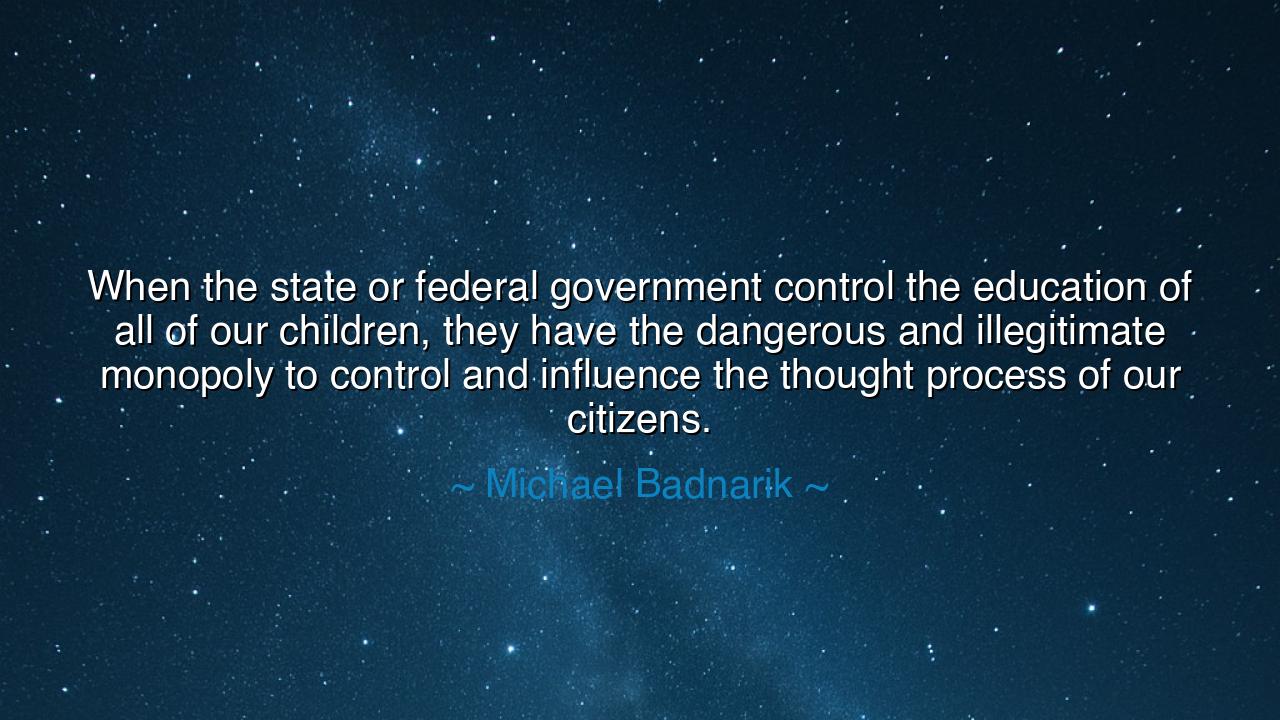
When the state or federal government control the education of all
When the state or federal government control the education of all of our children, they have the dangerous and illegitimate monopoly to control and influence the thought process of our citizens.






In a time when minds are more valuable than gold and truth more fragile than glass, the words of Michael Badnarik rise like a torch in the night: “When the state or federal government control the education of all of our children, they have the dangerous and illegitimate monopoly to control and influence the thought process of our citizens.” These words are not mere criticism; they are a warning, carved from the wisdom of history and the understanding of human nature. For the control of education is the control of the future, and whoever shapes the mind of the child commands the destiny of the nation.
The origin of this truth lies in the oldest struggles of civilization. Every empire, from the Pharaohs of Egypt to the Caesars of Rome, knew that power over the body was temporary, but power over the mind was eternal. They built schools not to awaken thought, but to mold obedience. When Badnarik speaks of the “dangerous and illegitimate monopoly,” he reminds us that education, when seized by the state alone, becomes not a tool of enlightenment, but a weapon of influence. Knowledge ceases to liberate—it begins to domesticate. The mind becomes an instrument of policy rather than a garden of curiosity.
Consider the tale of Plato’s Republic, where the philosopher warns of the “noble lie” — a myth told by rulers to preserve order. The guardians of the state, he said, must shape the beliefs of the people, so they accept their place without rebellion. Plato meant this as theory, yet centuries later, rulers made it practice. From the Roman Church’s control of medieval learning to the strict indoctrination of totalitarian regimes, every age has seen the same pattern: when the state holds the keys to knowledge, it decides which doors may never be opened. And a people who cannot open doors of thought soon forget that doors exist at all.
History offers darker examples still. In the twentieth century, nations such as Nazi Germany and the Soviet Union built vast systems of state education designed not to teach truth, but to enforce loyalty. Children learned not how to think, but what to think. Their textbooks were hymns to the state; their teachers, priests of ideology. Independent thought was heresy, punished by scorn or exile. The result was not enlightenment, but conformity—the death of the questioning mind. And when questioning dies, tyranny begins. For no chain is stronger than the one forged in the mind.
Yet Badnarik’s warning is not born of despair—it is born of faith in the individual. He believes, as did the founders of the American Republic, that education is sacred not because it belongs to the government, but because it belongs to the people. The founders themselves learned from books they chose, guided by mentors of their own seeking. They were self-taught in the truest sense, students of liberty, not of authority. Thomas Jefferson once wrote that an educated citizenry is the best defense against tyranny—but he also feared a system where education might one day become the handmaiden of government power. That fear, Badnarik reminds us, was not unfounded.
To allow the state or federal government unchecked control over the shaping of minds is to surrender the first freedom: the freedom to think. The danger is subtle and slow. Governments rarely say, “We will control your thoughts.” Instead, they claim to “standardize learning,” to “protect young minds,” or to “unify education.” But uniformity, though it sounds like harmony, is the silence of diversity. A thousand minds thinking alike are not in agreement—they are in captivity. True education should awaken the power of reason, not prescribe the limits of it.
The lesson, then, is clear and solemn: guard the independence of education as fiercely as the independence of speech or faith. Parents must reclaim their sacred duty to guide their children’s minds, not surrender them wholly to bureaucrats. Teachers must serve truth, not policy. And every citizen, young or old, must become a lifelong student, learning not merely what is taught, but why it is taught. Read widely. Question boldly. Teach your children to seek truth, not approval. For a people who depend on the state for their knowledge will one day depend on it for their permission to think.
So, my child of the future, remember this: freedom begins in the mind. The battle for liberty is not fought with swords or votes alone—it is fought in classrooms, in conversations, in the quiet courage to ask “why.” When you hear one voice claiming to speak for all, be wary. When learning becomes obedience, resist. For no empire can enslave the body of a people whose minds remain free. The state may govern, but it must never own the soul of its citizens.






AAdministratorAdministrator
Welcome, honored guests. Please leave a comment, we will respond soon